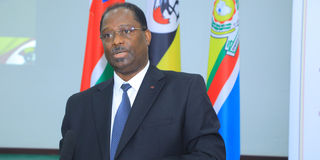Prime
S.Sudan - Uganda forum will boost trade

General Ronnie Balya, Uganda’s Ambassador to South Sudan. PHOTO/BETTY NDAGIRE
What you need to know:
Uganda and the government of South Sudan signed a Memorandum of Understanding in 2012. But before all these could be implemented in 2013, trade took another turn as war broke out in South Sudan. Fear of conflict following South Sudan’s independence in 2011, is also said to have reduced the trade volume and revenue. Ahead of the first joint business forum in Juba the South Sudan capital between July 18 to July 19, Gen Ronnie Balya, Uganda’s Ambassador to South Sudan spoke to Prosper Magazine’s Betty Ndagire on what the Chancery is doing to protect interests of Uganda’s business community in South Sudan.
Are Uganda traders safe and what is the embassy doing to ensure their safety?
The The Republic of South Sudan is an independent country with a government though existing in an International system. The Uganda Embassy has no military forces in South Sudan. But we work with the host government and its security services to ensure safety and security for Ugandans in South Sudan. Generally, they are safe despite the isolated incidents.
Ugandans are the biggest diaspora community in South Sudan involved in formal and informal business. Ugandans are also the most daring people in the region. They cannot be easily intimidated. You hear them say that dying of poverty in Uganda, they rather die from a bullet in South Sudan.They have promoted the spirit of regional cooperation and regional integration by promoting trade.We shall protect them and their businesses. After that bitter war, the government is doing its best to restore systems in all sectors. Most systems broke down because there was a total breakdown of law and order.
Regarding compensation of those Ugandans who were killed, what does the law say?
For compensation for those who were killed on the road, there legal technicalities which must be examined bilaterally.Remember it is not only Ugandans, there also other nationalities. This issue will be discussed bilaterally.
What are the Chancery’s plans to ensure Uganda’s business interests?
Uganda’s current exports to South Sudan are between $350m (Shs1.3 trillion) and $400m (Shs1.5 trillon). Before the war in 2013, it was approaching $1b (Shs3.7trillion). South Sudan exports to Uganda are valued at $86b (about Shs323b).One way of securing Uganda’s interest is through government to government engagements and private sector to private sector both in Uganda and South Sudan. We believe in that joint strategy of working together, we shall secure our business interests like we have done on the launch of a joint business forum. In Mid July during the forum, we shall have a symposium and exhibition to showcase what we have and what the South Sudanese have and use the opportunity to discuss challenges and opportunities.
The second avenue is the Joint Permanent Commission(JPC) meeting which is government to government. The ministries, departments and agencies from both countries discuss issues of bilateral interest. They discuss threats, challenges and opportunities in the area of trade, security and immigration among others.
This JPC will discuss various policies and strategies in the two countries. We shall also discuss interconnectivity projects, for example; cross border roads to promote movement of goods and services and people.We are looking at building of the Gulu-Juba railway which will help to reduce pressure on the Gulu-Nimule road. All these heavy vehicles from Mombasa use this road to connect to South Sudan. We want that road to remain for the small vehicles once the railway is constructed.
We are planning to put up the Karuma Juba electricity line to serve South Sudan. This line will help these people to run industries and other things. We shall also discuss communication and other interconnectivity projects.The issue of traders who have not been paid for a long time, borderline reopening which is over 500km will also be discussed.
The border is porous in some areas. Recently, we had a bad incident where one Sudanese Soldier was killed because of the unclear border line issue. I think he crossed into Uganda and the patrol shot him. It was an unfortunate incident. We have a joint technical team in place to re-demarcate the border and put pillars.
What opportunities can Ugandans in South Sudan explore?
Uganda’s leading exports to South Sudan include; cereals for example maize flour, sugar, beverages, beer, soft drinks, vegetable oil, building materials like iron bars and cement. While imports from South Sudan include; scrap iron, hard timber among others, we need to do more market surveys for various opportunities. We encourage the Uganda business community to engage in joint ventures with the South Sudan business community in Agro-based, hospitality, and real estates industries.
Accommodation is very expensive in and outside Juba. A small three bedroom house going for $10,000 per month and you can get it in Kampala at $2000, which is five times the price in South Sudan. We have over 30 hotels in Juba and they are always full. South Sudan is a rich country endowed with resources like oil and gas in larger quantities than Uganda. Oil production now stands at 180 barrels per day. The South Sudan government wants to restore the previous capacity of before the war in 2013 which was 350,000 barrels per day.
Sometimes the unrest in North Sudan affects the flow of oil especially in the area of Port Sudan, where the oil is shipped for export. South Sudan has very fertile soils for commercial mechanised agriculture.We need to replace the World Food Programme (WFP) in South Sudan. Africa should be feeding the world, not the other way round. There is hunger in South Sudan, over 60 per cent of the population is food insecure. So this is another opportunity Uganda can take up.
South Sudan is two and a half the size of Uganda. But Uganda has approximately 46 million people while South Sudan has 13 million people yet this country is very big. So the country is empty and green. There is no desert in South Sudan. You can have large-scale mechanised agriculture and livestock farming.
What is the Embassy doing to grow the trade volumes?
We want favourable trade between the two countries so that both countries mutually benefit. In 1986 when we captured power, all industries had collapsed.Kenya was feeding Uganda with industrial products. But now, the balance of trade is in favour of both countries. We shall grow the trade volumes by addressing trade barriers, tariff barriers like reducing taxes. For the non tariff barriers, we need to remove unnecessary check points which inconvenience traders along the road, we also need to address the fragile peace and security concerns in some areas where there is insurgence, inter communal violence and cattle raids.
We shall work on the potholed roads that delay traffic, handle the issue of storage limitations by building large sites,and address financial limitations for traders and investors.
Lack of access to soft loans with good terms and conditions is a big challenge. Kenya has Kenya Commercial Bank and Equity Bank in South Sudan and this has helped their traders and investors. A Uganda Bank can also extend services to South Sudan. This will help the Uganda traders and investors.
What is the South Sudan government doing about the refugees in Uganda?
According to International law, refugees are under the care of the UNHCR. The host country through the office of the Prime Minister works hand in hand with UNHCR to ensure law and order and peaceful coexistence with the indigenous community. Our ideology as pan africanist, we have no refugees in Africa. They are at home. The continent Africa is their home. The borders were imposed on us by the European colonialists. Our ancestors used to move freely across these artificial borders.





